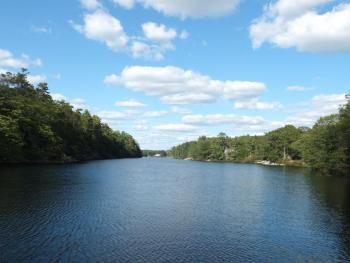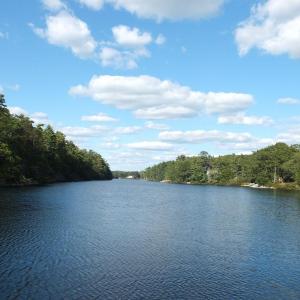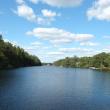West Harbor Pond siphon in jeopardy
The West Harbor Pond Watershed Association (WHPWA) has received an ultimatum that would require the siphon that it installed this winter in West Harbor Pond to be shut down permanently. When West Harbor Pond was created as an ice pond in 1880, a siphon was installed to maintain the water quality by removing salt water from the Pond. After the 1880 siphon broke in 2008, salt water from the harbor, which enters the Pond at extreme high tides, was no longer being evacuated. Instead, the heavier salt water settled to the bottom of the Pond, finally reaching a volume of dense water sufficient to prevent the Pond from experiencing spring and fall turnover. In a normal freshwater lake, this seasonal turnover would cleanse and reoxygenate the water in the lower depths. On March 8th, the West Harbor Pond replacement for the broken 1880 siphon began operating. This was the culmination of five years of work, a $15,000 Coastal Communities grant, a successful $60,000 fund-raising campaign, a donation of seasonal water pipe and labor from the Boothbay Region Water District, and the support of the Town of Boothbay Harbor.
Superintendent of the Boothbay Region Water District, Jon Ziegra said the Water District was pleased to help with the WHP siphon project. “It allowed us to put used seasonal water pipe to a good use and provided an excellent training opportunity for our employees during our slow season. Best of all, it allowed us to be good neighbors and community partners in the important task of improving water quality on the Boothbay Peninsula.”
When plant matter decays in an anaerobic environment, it produces hydrogen sulfide, a natural gas which has the odor of rotten eggs. Every freshwater lake in Maine experiences a build-up of hydrogen sulfide in its lower depths during the summer. In the fall, the seasonal turnover recirculates the water and allows the hydrogen sulfide to dissipate. Because West Harbor Pond has not turned over for several years, the concentration of hydrogen sulfide has built up in the lower part of the Pond.
When the new siphon began working in early March, drawing water from the bottom of the Pond and expelling it into the harbor, there was an odor of hydrogen sulfide in the immediate vicinity of the siphon outfall. This occurred because the saline water on the bottom of the Pond was less dense than the water in the harbor. Thus, upon leaving the siphon’s outfall, the water from the Pond rose directly to the surface, where the hydrogen sulfide escaped into the atmosphere, to be dissipated by the breezes in the harbor. Prior to 2008, when the original siphon ceased operating, the water evacuated into the harbor carried no odor of hydrogen sulfide. This suggests that once the siphon evacuates the hydrogen sulfide-laden water from the bottom of the Pond, the Pond will resume turning over seasonally and the odor will disappear permanently so long as the siphon continues to operate.
In mid-April, the West Harbor Pond Watershed Association and the Boothbay Harbor Yacht Club agreed that the WHPWA would turn off the siphon on May 24th and leave it turned off until at least mid-August in order to strike a balance between the need to restore the water quality of the Pond and the recreational activities in the inner harbor during the summer season.
In mid-May, a representative of the Board of Directors of the twelve-unit Oak Grove Condominiums (OGC), which are located at the east end of the West Harbor Pond dam and which face on both the Harbor and the Pond, contacted the WHPWA to complain about the hydrogen sulfide odor. The WHPWA explained its present plan to shut the siphon off on May 24th if the smell persisted until then and to leave it shut off until mid-August. In deference to the OGC’s concerns, the WHPWA offered to extend the siphon shut-off until after Labor Day. The OGC rejected this offer and demanded 1) that the siphon remain off until at least Columbus Day and 2) that the WHPWA undertake water quality testing of the harbor at its own expense. The WHPWA declined to agree to these demands. It voluntarily shut off the siphon on May 24th as previously planned.
On June 18, the OGC’s attorney sent a letter to the WHPWA and to the Town of Boothbay Harbor, which was the applicant for all the permits issued in connection with the siphon. The letter alleged that the water discharged by the siphon violated Maine’s clean water statutes and made two principal demands: 1) that the siphon remain shut down until the Town and the WHPWA could demonstrate “via laboratory testing” that the water discharged by the siphon no longer had any of the characteristics complained of by the OGC, and 2) that the Town and the WHPWA reimburse the OGC a substantial sum for its water testing and its legal fees.
Boothbay Harbor board of selectmen chair Mike Tomko declined to comment on behalf of the board, but noted legal counsel has been retained. Merritt Blakeslee, a member of the WHPWA’s Board of Directors, said WHPWA has also retained legal counsel on the matter.
Blakeslee said it is the goal of the WHPWA to ensure that, at the appropriate time, the siphon can be turned back on to resume the task of restoring the water quality of West Harbor Pond. He pointed out that the Pond is owned by the state of Maine and is a source of natural beauty enjoyed by the entire community. He stated that the WHPWA has an obligation to the many contributors to last summer’s Campaign to Save West Harbor Pond to continue the work of restoring the water quality of the Pond. The WHPWA is a small non-profit group, Blakeslee said, and the reserve fund set aside for the future maintenance of the siphon could be quickly exhausted by any prolonged legal proceedings with the OGC. He stressed that the WHPWA is committed to reaching a compromise with the OGC that protects the interests of both sides and of the Boothbay Harbor community as a whole.
Event Date
Address
United States

























